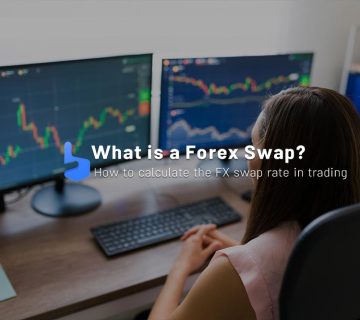What you are about to read:
FOMO or the fear of missing out is a relatively new term in the English language, but it’s inherent in our daily lives. This real phenomenon of the modern digital age affects many aspects of life and personal decisions, but it can also significantly impact trading behaviors, referred to as FOMO in trading.
For instance, the fear of missing out can lead to entering trades without sufficient thought or closing trades at inappropriate moments because it seems like what others are doing. It can even make traders risk significant capital due to lack of research or the need to chase after others. For some, the FOMO feeling, generated by seeing others’ success, intensifies mainly due to the fast-paced and volatile cryptocurrency markets.
To help traders better understand the concept of FOMO in the trading and its potential drivers and how they affect a trader’s success, this article from Brokerland identifies these motivators and explores ways to overcome fear and other emotions that can impact trading stability—a crucial trait for successful traders, as elaborated further in the article.
What Is FOMO In Trading?
Whether interested in stocks, crypto transactions, or forex trading, the fear of missing out, essentially the FOMO concept, can lead to irrational choices. When traders feel they’re missing crucial opportunities that other traders are successfully capitalizing on, they experience this anxiety. For example, it’s the fear that if you don’t trade a popular currency pair, you might miss an opportunity to profit.
When FOMO becomes a habit, breaking the cycle can be challenging and often results in very real and costly consequences. So, how do we strike a proper balance between FOMO and regular trading? Let’s first look at what we can learn from this feeling on social media.
The Connection Between Social Media and FOMO
Trading in the age of social media is vastly different. Excessive information and both successful and unsuccessful stories, mistakes, and losses of others are constantly reaching our ears. This is especially true in the world of cryptocurrencies.
Cryptocurrencies aren’t regulated by any central bank, and they aren’t influenced by national currencies. This means that the prices of cryptocurrencies like Bitcoin, Ethereum, and others are often determined by investors’ sentiments rather than significant economic events. This circumstance facilitates manipulations like pump and dump.
In fact, FOMO is so ingrained in crypto trading that it has created a new class of investments. Think about meme coins like Dogecoin or Shiba Inu and their massive fluctuations. In the spring of 2021, Dogecoin saw a surge in value before Elon Musk’s appearance on “Saturday Night Live” due to the billionaire’s enthusiastic tweets. After Dogecoin was recognized as an “excitement” during the show, it then experienced a near 30% drop in the next 24 hours.
When it comes to cryptocurrencies, FOMO in trading can lead inexperienced traders to buy currencies at their highest prices or, conversely, sell them at their lowest. In the financial market, this feeling may cause traders to ignore overbought or oversold signals on price charts and try to profit more from unverified information, ultimately resulting in losses.
Identifying FOMO in trading
In some ways, breaking free from FOMO is sometimes more of a life skill than a trading skill. It requires a strong mindset and awareness. However, the first step in breaking this cycle is learning to identify it within yourself when a hot opportunity presents itself. Here are three quick tests to check if you experience the fear of missing out when faced with a trading decision:
- Do you experience physical changes? Is your heart racing, or do you start sweating?
- Are your thoughts increasingly focused on past experiences of missing out on significant gains?
- Do you describe your thoughts more as an urge to make a trade rather than a decision to execute it?
If the answer to one or more of these questions is “yes,” you likely experience FOMO in trading.
Once you’ve identified your FOMO, it’s important to halt that feeling, take a breath, and acknowledge it without acting on it. This is likely the hardest thing to do when the world around you is in a frenzy of excitement or fear. However, stabilizing your emotional state before engaging the more rational parts of your mind in the trade is crucial.
Reducing the Risk of it in the Financial Market
A stable mind alone isn’t enough to combat the urge to act when faced with a supposedly hot trade. You need a valid benchmark to evaluate opportunities amidst the available hype.
This starts with a trading plan. When there’s no parameter to gauge the accuracy of your trading choices, you’re likely to succumb to FOMO and lose control. This leads to a tendency to chase the next big score, accompanied by numerous bad trades.
A solid foundation for a trading plan provides a necessary framework for creating a steady growth path and resilience against FOMO in trading. Your trading plan should include:
- Clear and achievable goals: How much and how do you want to profit? Test these goals against market averages.
- Strong analysis: This analysis should be continuous and based on past market data.
- Realistic risk and reward tolerance: Define your risk tolerance levels and have an appropriate risk/reward ratio. Avoid trying to justify deviations from it.
Avoiding this feeling in the financial market and forex trading requires a measured approach that is learned and practiced. Here are six behavioral tips that can help you deal with it:
Stick to your beliefs and stick to the facts. Hold on to your beliefs and stick to verified information. Instead of relying on social media rumors, which usually lead to the fear of missing out in the market, opt for confirmed news. Choose analysis over opinions.
To prevent feeling FOMO, never trade out of fear. Focus on your trades, not others. Initially, concentrate on concerns about what others are doing, focus on your goals and activities.
Don’t Panic. Set your stop-loss and take-profit levels to prevent margin calls and stick to them.
During volatile market conditions, it’s crucial to manage your risk effectively. Setting stop-loss and take-profit levels helps you control potential losses and secure profits. Adhering to these predefined levels, even in the face of market fluctuations, is essential to avoid emotional decision-making triggered by the fear of missing out or FOMO.
Have a Well-Defined Plan and Monitor Your Activities Over Time. Establish a clear trading plan with specific goals and track your activities consistently. Regularly reviewing and adjusting your plan based on market conditions and your performance can enhance your decision-making process.
Remember, This Isn’t Your Last Trade. There will be other opportunities. If you miss one, another one will follow, possibly aligning better with your strategy.
Maintain a realistic perspective and understand that the financial markets are dynamic, offering multiple opportunities over time. Avoid dwelling on past losses or missed opportunities. Every trade is a learning experience, contributing to your overall growth as a trader.
Be Realistic in Your Expectations and Focus Not Solely on Positives. Consider your risk/reward ratio and act accordingly.
Maintain a balanced view of the market by acknowledging both potential risks and rewards. Avoid being overly optimistic and base your decisions on a well-thought-out risk/reward ratio. This approach fosters disciplined trading and helps mitigate the impact of FOMO in trading.
Keep Your Focus on Your Goals and Trade According to Your Strengths and Trading Style. Prioritize your trading objectives and adhere to your strengths and preferred trading style. Align your trades with your unique strengths, helping you stay consistent and resilient in the face of market fluctuations.
Look to the Future. Avoid dwelling on the past; the mind naturally focuses on negative aspects that can contribute to FOMO. However, learning not to engage in this practice is crucial. While losing money might seem significant initially, confident and strategic traders understand that it’s just a part of the larger picture. There will always be another opportunity, and when that becomes part of your trading routine, avoiding FOMO in trading becomes much easier.
Summary
In summary, the fear of missing out is a powerful emotional force that permeates the trading world, driving investors toward impulsive decision-making in the hope of quickly capitalizing on changing market conditions. This feeling in the financial markets manifests as an incessant pursuit of opportunities, often spurred by the fear that others are profiting while the individual remains on the sidelines.
Even if a carefully designed investment strategy implies a deliberate departure, jumping into the latest stocks or popular cryptocurrencies is challenging. Traders succumbing to FOMO may find themselves chasing fleeting market highs, overlooking fundamental analysis, and succumbing to the allure of rapid profits. Managing this feeling is a vital skill for traders, as consistent decision-making lays the foundation for long-term financial success in the unpredictable world of trading.











